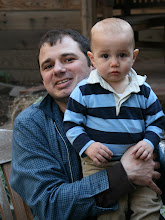Naturally in any triangle of human relationships someone is bound to feel left out. When it came to my relationship with Stewart and Max, however, it never crossed my mind that this concept would directly apply to me! When I am alone with Max he gazes at me like I am his one and only. But whenever Stewart enters the room, I suddenly become chopped liver in Max’s eyes and he only has time for his papa. At first, I championed Max’s fondness for Stewart. I loved that Max would smile, get all giddy, and make his way immediately over to Stewart when he came home from work. First off, Stewart is an excellent dad and deserves all the recognition that Max can give him. Secondly, it is an easy way to pass Max off to Stewart at the end of the day so that I can have some time for myself.
Over the past month or so though I’ve lost my benevolent attitude towards Max’s behavior, because his preference for Stewart has grown beyond my limits! These days, when Stewart tries to hand Max over to me after they have spent time together, Max starts wailing and reaching out for his papa. When Max is with me in one room of the apartment, and knows that Stewart is somewhere else in the apartment, he will crawl his way to whatever room Stewart is in. And there is a game that Max likes to play that is particularly disheartening. When Max is being held by Stewart and people come up to them -- family members, friends or even random strangers -- Max will reach out his hands, motioning them to take him from Stewart; but, just as they are about to do so, Max turns into a big tease, yanking his hands away and turning in the opposite direction. I used to think this game was sort of entertaining, until I became the main target!
I will admit that my feelings get hurt, especially given that I am the stay-at-home parent who spends all day with the kid, entertaining him, feeding him, changing his diapers, soothing him and looking after his many other needs. I had been in a complete state of denial that Max would ever favor one of his parents over the other -- but especially over me given how much of this daily love and sacrifice I dispense! I mean, come on folks, how many kids get to spend their days with a cool fun dad like me?!
Fortunately, Max’s favoritism of Stewart is not personal, but rather a perfectly normal phase of childhood. In a recent poll at Parents.com, more than 90 percent of mothers and fathers said that their children favored one parent over the other at some point. Indeed, favoritism is considered healthy behavior for an emerging toddler. According to Parenting magazine:
Playing favorites is actually a sign of emotional and cognitive growth. It helps your child explore relationships and intimacy, exercise her decision-making skills, and assert her independence.
It is also not unusual for a one year old to favor the working parent, who is not with the child all day, over the stay at home parent. In other words, all of my nurturing of Max that I thought would beholden him to me is apparently working against me! Basically, he’s taken me for granted – a good way for a baby to feel, for sure. Stewart, meanwhile, leaves Max at least every weekday morning, so Max is naturally more clingy to him when he is around, since Stewart’s companionship is not as much of a given in Max’s mind.
I’ve also learned that a child will go through phases of favoring one parent for a spell, and then switching 180 degrees and preferring the other parent instead. For example, check out these mothers in an on-line parenting forum complaining about their husbands being favored when their kids were one year olds, and the encouragement back from other moms to wait it out because soon enough the shoe will be on the other foot! And I have to admit that this has been our experience. When Max was three or four months old, Stewart used to come home from work and complain that Max would only look at me and not him. I would say I think you’re imagining things, but secretly I was a little happy about it since I was spending all this time with Max and appreciated the recognition from him.
I hope Stewart is more mature than me and is not secretly enjoying the current period of time of being the favorite, however long it might be. Because it isn’t fun. Despite knowing in my head all that I mentioned above about why I shouldn’t feel shame about being the odd man out with Max, I still do. I am not exactly sure why, but it is probably because I spend most of my days with Max and still feel a little rejected by him. All I can tell myself is that just as it is a natural phase for him to sometimes act as he does, it is also natural for me to sometimes feel disheartened by it. But I am not complaining, because one thing that is constant throughout all of Max’s temporary phases is how much I love him, and how much I know he loves me back.





